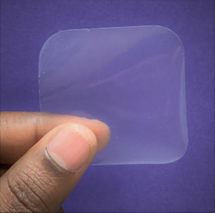Monthly Dapivirine and Levonorgestrel Dual-Purpose Vaginal Film

Similar to thin breath mint strips that dissolve in the mouth, vaginal films are products designed to dissolve after being inserted in the vagina. The use of films for HIV prevention has been explored in a number of studies of quick-dissolve films and films that would slowly dissolve within one week.
Now, researchers at the University of Pittsburgh and Magee-Womens Research Institute (MWRI) are working on the development of films designed to dissolve over the course of one month – one containing the antiretroviral (ARV) drug dapivirine that is being designed as a discreet, user-controlled HIV prevention method for women and another film containing dapivirine and the hormonal contraceptive levonorgestrel (LNG) that would provide protection against both HIV and unwanted pregnancy for a month at a time.
Similar to the dapivirine-only film, the dual-purpose vaginal film is designed so that when placed inside the vagina and coming in contact with vaginal fluid, it would slowly begin to dissolve, and in doing so, release dapivirine and LNG. Both drugs would continue to slowly be released over the course of a month until the film completely dissolves and all drug has been delivered in the vagina. This means there would be nothing to remove or discard. The user would simply insert a new film for another month of discreet dual protection.
Dapivirine belongs to a class of ARVs called non-nucleoside reverse transcriptase inhibitors (NNRTIs) that prevent HIV from making copies of itself inside human cells, therefore, preventing the spread of HIV inside the body. Dapivirine is already known to be safe and effective for preventing HIV when formulated as a monthly vaginal ring. LNG is an approved hormonal contraceptive that is known to be safe and effective and has long been used in contraceptive products, including intrauterine devices (IUDs).
Both the dapivirine-only monthly vaginal film and the dual-purpose monthly vaginal film are very early in their development – the dual-purpose film, more so. Neither have been evaluated in women. Researchers anticipate being ready to conduct a first-in-human trial of the monthly dapivirine film in 2025, and depending on results, would follow with a clinical trial of the combination film. In the meantime, extensive laboratory and animal (non-human primate) studies of the dual-purpose film are ongoing.
The University of Pittsburgh/MWRI team is collaborating with the Population Council in the development of both dapivirine vaginal film products. The Population Council is a global nonprofit research organization that in 2022 acquired the dapivirine product pipeline from the International Partnership for Microbicides.
